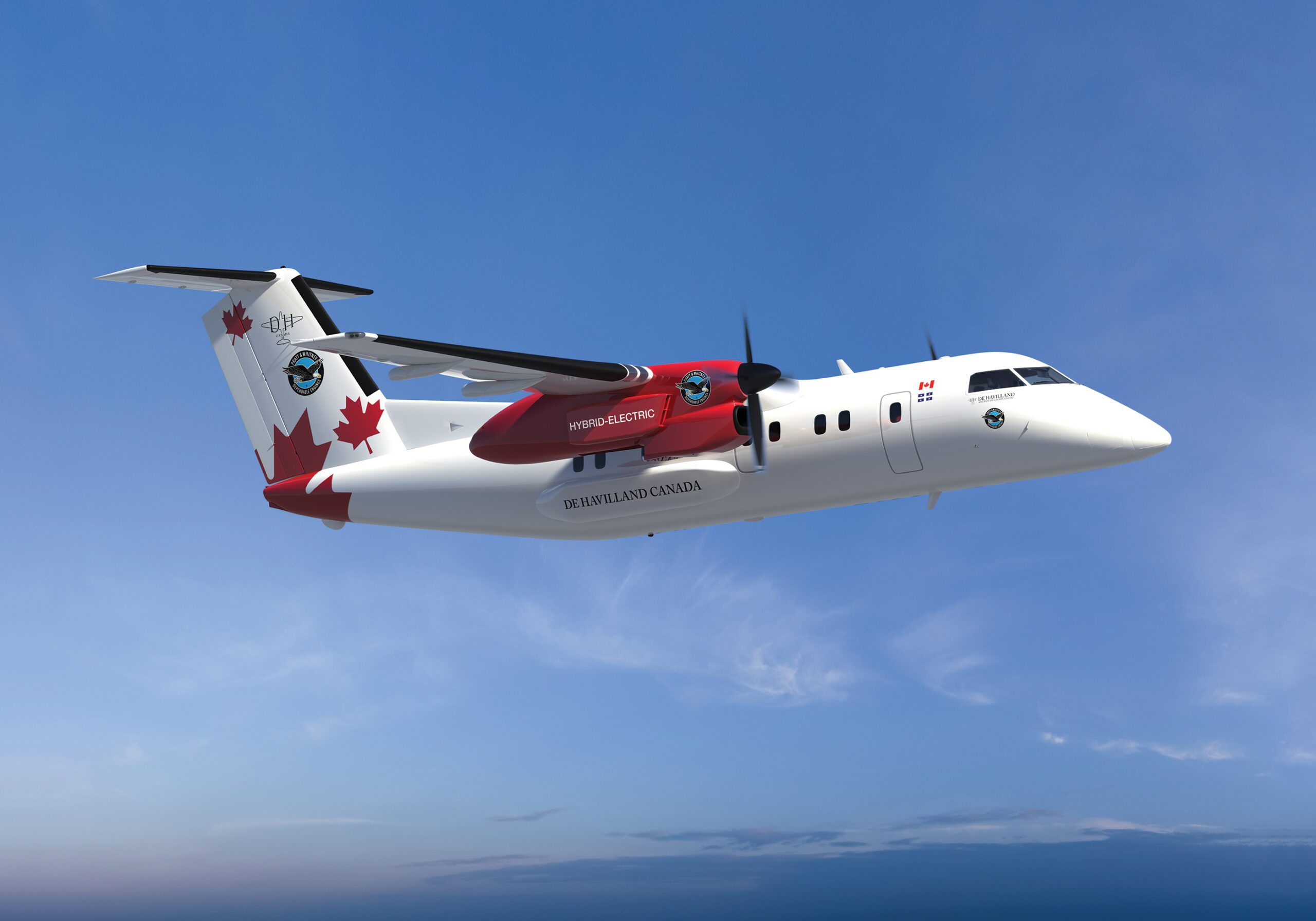
7DA26147 3F69 4167 A5D7 B1EC465B1E32 scaled
Pratt & Whitney Canada (P&WC) is to develop a hybrid-electric engine and test it on a De Havilland Canada Dash 8-100. The first ground tests are planned for 2022 but the first flight will not happen until 2024, the engine maker announced today. The hybrid-electric propulsion technology and flight demonstrator program are part of a CS $163 million investment that is supported by the governments of Canada and Quebec.
P&WC has a long history with traditional gas turbine engines, including the trusted PT6 that has clocked over 400 million flight hours, and the PW100/150 series that powers the DHC Dash 8s or ATR aircraft. But the future is electric, which is fully recognized by the Canadian government. Part of its ‘green recovery plan’ is a Strategic Innovation Fund that backs the technology demonstrator and should help put Canada’s aerospace industry at the forefront of global efforts to make aviation more sustainable. The Government of Quebec supports the project through Investissement Québec and the Ministère de l’Économie et de l’Innovation, as part of an initiative known as, “Aéronef pour la mobilité numérique et verte de demain” (Green and Digital Aircraft of Tomorrow).
The hybrid-electric demonstrator will include an electric motor and controller from Collins Aerospace, like P&WC part of Raytheon Technologies. On an artist’s impression from DHC, it will replace the number 2 PW100-engine on the Dash 8-100 which has been provided by De Havilland Canada. The aircraft will be further modified to accommodate the batteries. The cockpit will get interfaces to safely monitor and control the test engine. DHC will conduct the flight test program in direct cooperation with Transport Canada under an experimental flight permit.
New engine should produce 30 percent better fuel consumption
The hybrid-electric demonstrator should produce a thirty percent reduction in fuel burn over the PW100-series. By comparison: General Electric and Safran target a twenty percent fuel burn improvement with their recently announced RISE demonstrator compared to the CFM LEAP.
“Pratt & Whitney Canada is proud to be a leader toward ever more sustainable aircraft propulsion technologies and be an integral part of Canada’s green recovery plan,” said P&WC President Maria Della Posta in a media statement. “With a long-time commitment to sustainability and as Canada’s top aerospace investor in research and development, having invested CS $500 million annually, we are driving economic growth, innovation, and workforce expertise to benefit the environment. Hybrid-electric technology has an important role to play in enabling the next step-change in efficiency for aircraft engines, and we are uniquely positioned to demonstrate this potential.”
P&WC has made the development of hybrid-electric propulsion technology a core element of its strategy to make aviation more sustainable. However, it will also continue to advance its gas turbine engine and adapt them for the use of sustainable aviation fuels (SAFs). The company will continue to work with industry partners globally on a wide variety of projects targeted at increasingly sustainable aviation to benefit our customers and the environment.
Hybrid-electric golden opportunity for DHC
For De Havilland Canada, the hybrid-electric engine could be a golden opportunity to offer a new version of the Dash 8-series. The OEM is in the process of winding down production in Downsview as the lease of the site has been terminated. DHC still hasn’t announced where it will restart the aircraft assembly of the Dash 8, which Longview Aviation Capital took over from Bombardier in May 2019. Its backlog is running out and De Havilland would need something different like hybrid-electric propulsion to get itself back on the radar or otherwise risk losing out to ATR and Embraer, which plans to launch an all-new turboprop in 2022.
The latest ‘all Canada’ initiative must be seen as an opportunity to demonstrate the country’s environmental leadership in the aviation sector, says DHC Chief Transformation Officer, Dave Riggs. For Quebec, which already announced the SAF+ Consortium earlier today, the hybrid-electric demonstrator is a major project that will drive Quebec into the future, said Premier François Legault. “We will develop tomorrow’s helicopters and airplanes today, in Quebec. These aircraft will contribute to the economy while reducing CO2 emissions. The aerospace industry will relaunch with vigor. Your government will be there to reinforce our leadership and ensure a strong future for Quebec’s aerospace industry.”
This effort is a follow on and a new chapter in the evolution of what was called Project 804 by UTC. The company produced this video back in 2019.
Comment from Airinsight:
What we see from the announcement today is a way that commercial aviation moves into a lower fossil fuel future. The industry cannot make this move as rapidly as society wants without government help. The switch from fossil fuels is a fundamental change in the way flights are powered.
If nation-states want or demand a greener future while keeping their commercial aviation industries generating business activities and tax revenues, then nation-states need to provide the foundation upon which industry can make the switch in fuels. Whether it is funding research into hybrid-electric, SAF, or hydrogen. The switch in fuels powering flight could become one of the greatest public-private partnerships. We expect the Canadian model to be copied.
Views: 18




